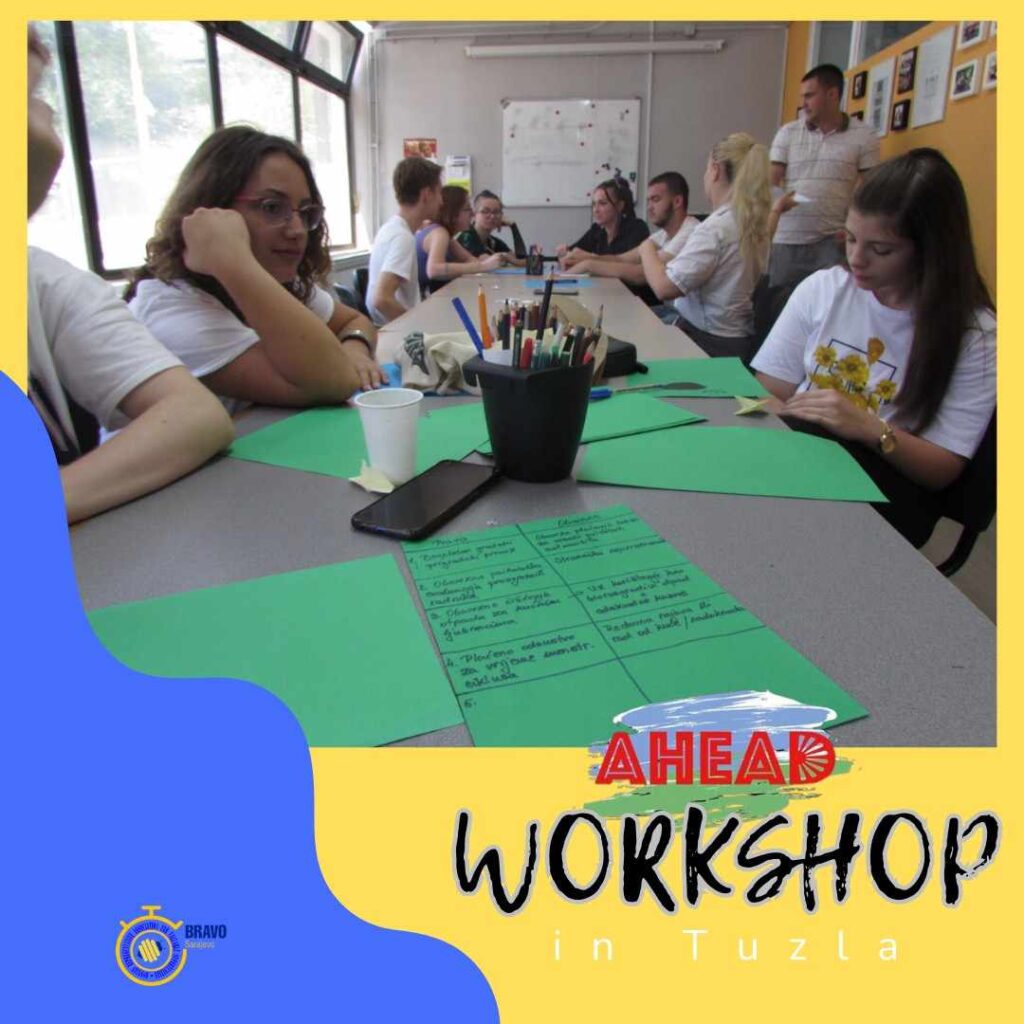
On the 9th of September, a local workshop on the topic of human rights was held in Tuzla, Bosnia and Herzegovina. The workshop aimed to educate participants about human rights and foster interactive discussions on this crucial subject. Organized by BRAVO, the event successfully brought together a diverse group of individuals who shared a common interest in human rights advocacy.
The workshop was designed to be educative and interactive, incorporating various activities and discussions to engage participants actively. The agenda for the day included interactive activities that initiated discussion among the participants. Our wonderful Marko Divković and Vedad Atlić were key persons to lead this workshop and were successful in the task.
The workshop started with an interactive game, where participants had a chance to role-play randomly chosen roles in society. They had a task to put themselves in the character and try to identify which of the rights they have or don’t have from the declaration.
To encourage active participation and practical understanding, the first interactive activity involved presenting participants with various real-life scenarios related to human rights violations. Participants were divided into small groups and asked to analyze and discuss these scenarios, identifying the rights violated and potential solutions to address the issues.
The second discussion session focused on the challenges and opportunities in human rights advocacy, both locally and globally. Participants shared personal experiences, exchanged ideas, and explored potential solutions to overcome obstacles in advancing human rights causes.
Also, participants had an opportunity to make new laws for protecting human rights and the obligations that every person has according to that law. This activity encouraged their imagination and creativity in the way of protecting and spreading awareness of violating human rights.
Participants emphasized the fundamental nature of human rights inherent to all individuals regardless of race, gender, religion, or nationality. Human rights were described as universal, inalienable, and indivisible, forming the cornerstone of a just and equitable society. The discussion highlighted various challenges faced by human rights globally, including:
Violations: Participants expressed concern over ongoing human rights violations worldwide, such as political repression, discrimination, and violence against marginalized groups.
Lack of Awareness: The group recognized that many individuals remain unaware of their rights, which can make them vulnerable to abuse and discrimination.
Political and Economic Factors: Economic inequalities and political power imbalances were identified as significant obstacles to realizing and protecting human rights.
Also, participants stressed the importance of defining and recognizing marginalized groups, which often include but are not limited to ethnic minorities, indigenous peoples, LGBTQ+ communities, refugees, persons with disabilities, and socioeconomically disadvantaged individuals. Understanding the unique challenges faced by each group is crucial to addressing their specific human rights concerns. The discussion highlighted the pervasive issues of discrimination and inequality experienced by marginalized groups in various aspects of life, including education, employment, healthcare, and justice.
The local workshop on human rights held in Tuzla proved to be a valuable platform for education, discussion, and interaction. By combining informative presentations, interactive activities, and open discussions, the event successfully empowered participants with knowledge and practical skills to advocate for human rights in their communities. The workshop fostered a sense of solidarity among participants and inspired them to take an active role in protecting and promoting human rights.
More about AHEAD project:
AHEAD project aims to promote between youngsters non–discrimination and to combat racism, xenophobia and other forms of intolerance against Roma and other Ethnic minorities (mostly migrants). Partners jointly work on innovative good practice approaches, human rights-based narratives, training, official regular meetings, and European awareness raising campaigns. The project promotes inclusion, tolerance, mutual and multicultural understanding, and fight Roma, ethnic minorities, and migrants in Europe through an innovative approach that combines research, training (national and international) on antidiscrimination and on hate speech, round tables, seminars, the exchange of good practices, meetings between different representatives, stakeholders, CSOs, and youth associations, and a massive dissemination campaign.
The project aims to contribute to strengthening the capacity building of young victims (part of minorities) and the protection of youngsters belonging to minorities by supporting them in capacity building and structuring new mechanisms in public consultations in partner’s country (replicable all over Europe) on the issue of nondiscrimination and fighting every form of hate speech against ethnic minorities, Roma and migrants.
AHEAD’s aim is to tackle hate speech (also online) and to combat discriminations that target minorities in 5 areas of civil rights: education, labor, housing, health, goods and services, through specific training offered to 200 participants and through an new approach that combines quantitative research, public meetings with stakeholders, and awareness raising campaign. After providing expertise, building competences, advocating and raising awareness among youth people, partners will support the mobilization of young victims and will focus on Capacity building actions for youth, in order to involve Youngsters in decision making and into new structured automatic mechanisms to empower their active participation on hate speech and antidiscrimination.
